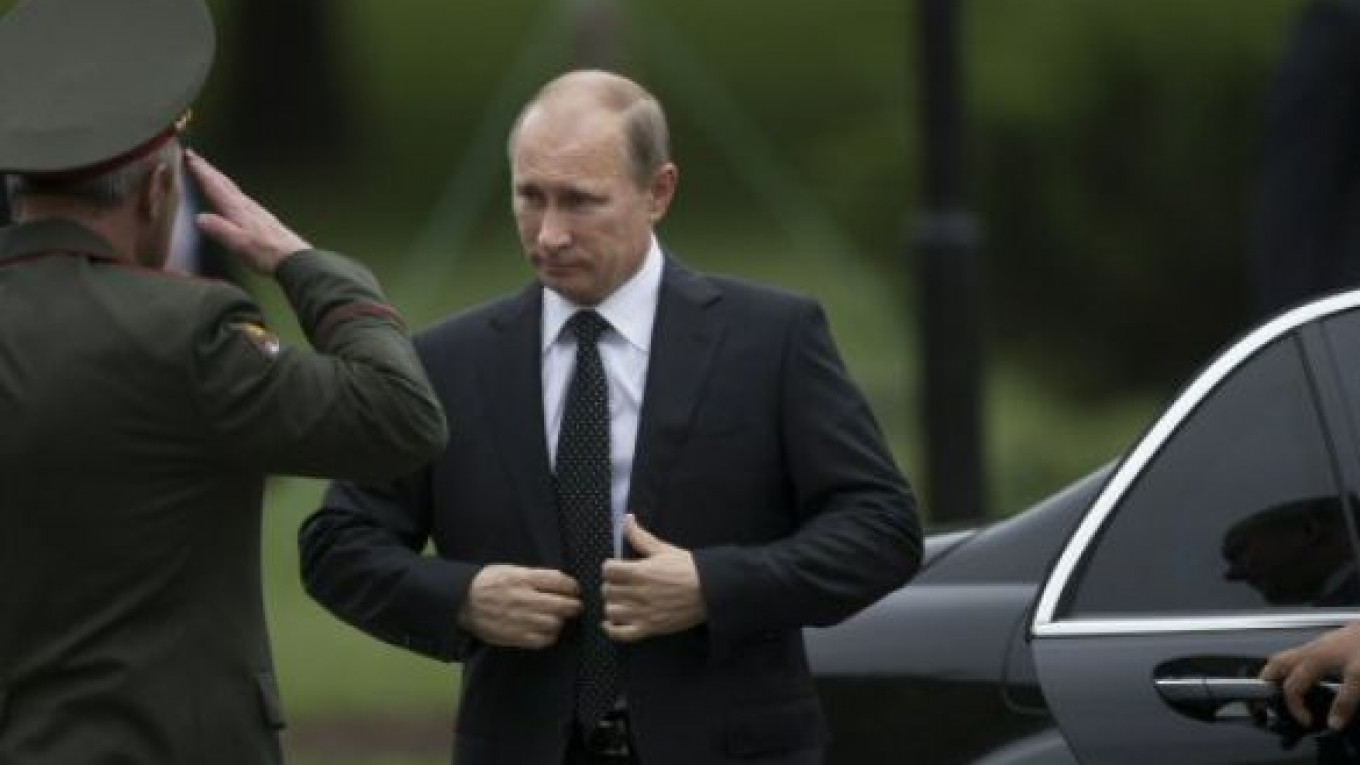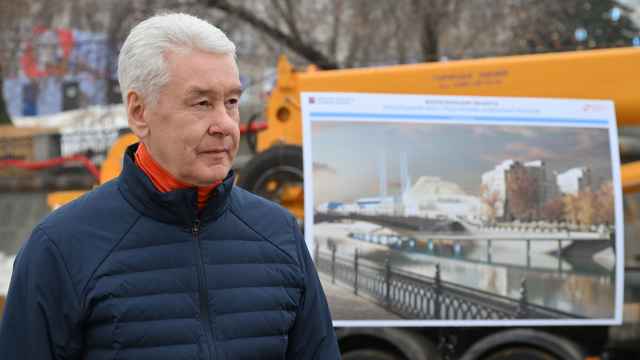President Vladimir Putin on Monday reiterated his stance that former U.S. intelligence analyst Edward Snowden needs to choose a country to seek asylum in and leave, amid reports that the American fugitive had officially applied for safe haven in Russia and more than a dozen other countries.
In only his second public comments on the case, Putin said Snowden could stay in Russia, but only if he stopped damaging "our American partners."
"Since he considers himself a human rights activist, it seems he doesn't want to stop his work. Therefore, he should choose a country he wants to go to and move there, but I don't know when this is going to happen," Putin said at a news conference following a meeting of the Gas Exporting Countries Forum in Moscow.
An unidentified immigration official told The New York Times on Monday that Snowden had applied for asylum in Russia, with WikiLeaks activist Sarah Harrison, who is traveling with Snowden, allegedly delivering an application to a Russian consulate in Sheremetyevo Airport late Sunday evening.
But a Federal Migration Service representative denied that report to RIA Novosti.
The Los Angeles Times reported Monday that a Foreign Ministry official said Snowden had applied for political asylum to 15 countries. The official called the applications a "desperate measure" by Snowden, who has faced difficulty applying to Ecuador for safe haven as he originally intended.
With Snowden in limbo at Sheremetyevo Airport, Putin has found himself master of the now-world-famous fugitive's fate, something the president evidently neither expected nor planned how to exploit.
Despite Putin's apparent efforts to distance himself from the issue, the former NSA analyst's extended stay has made Russia responsible for what happens to him in the future, a decision the Kremlin seems reluctant to make.
Putin signaled that one thing Russia was not prepared to do was to extradite Snowden to the U.S., saying Russia "never sends anyone anywhere," since "nobody ever sends anyone to us."
"In the best scenario we exchanged our spies for those who were detained, arrested and sentenced by a Russian court," Putin said.
But since Snowden is not a Russian spy, and Russian intelligence does not work with him, according to Putin, he is a "free man."
Security Council head Nikolai Patrushev told Rossia 24 TV on Monday that the U.S. and Russian presidents had given orders to the FBI and Russia's Federal Security Service, respectively, to look for mutually acceptable solutions to the Snowden case.
‘The Americans have delicately made Russia responsible…’
Nikolai Zlobin
Political analyst
"Their goal is not very complex, as they have to find a solution within the norms of international law. Today it is not possible to say that such norm or ready-to-make recipe exists," Patrushev said.
It was unclear whether Putin and U.S. President Barack Obama had discussed the situation personally. Obama told reporters in Tanzania that there had been high-level discussions on the issue but did not specify the participants.
Putin's foreign policy aide Yury Ushakov said Putin had not discussed the situation with Venezuelan President Nicolas Maduro, who is in Moscow for the Gas Exporting Countries Forum along with Iranian President Mahmoud Ahmadinejad and Bolivian President Evo Morales.
Several prominent public figures in Russia have offered Snowden support, perhaps laying the groundwork amid the public for Russia to grant Snowden asylum.
On Monday, eccentric United Russia lawmaker Alexander Sidyakin, known for his suggestion that political parties choose animals to make them stand out, said Snowden deserved to be awarded the Nobel Peace Prize.
"This man has done no less to get the Noble Peace Prize than U.S. President Barack Obama," he said at a roundtable at the Public Chamber.
Nikolai Zlobin, president of the Center on Global Interests, said it was not clear how Russia was pulled into the issue and what benefits it could glean from the situation.
"Now everybody is looking at what Russia will do, whereas all available options are not positive for the Kremlin," he said.
Ecuadorian President Rafael Correa, whose country had seemed willing to consider Snowden's request for asylum and to offer him support, downplayed Ecuador's role in the case and seemed to offer Russia full responsibility for the issue.
"This is the decision of Russian authorities," Rafael Correa told the Associated Press on Sunday. "He doesn't have a passport. I don't know the Russian laws, I don't know if he can leave the airport, but I understand he can't. At this moment, he's under the care of the Russian authorities. If he arrives at an Ecuadorian Embassy, we'll analyze his request for asylum."
Ecuadorian officials also told the news agency that Russia was responsible for the failure of its plans to let Snowden travel to its Moscow embassy, a prerequisite for considering his asylum application. Ecuador has renounced a safe passage letter earlier issued to Snowden that could have allowed him to cross borders en route to South America.
Putin's spokesman reacted to the news by sticking to the original line that the Russian president was not involved in the question but "prefers relevant bodies to deal with the issue."
"There is a rich body of public opinion on this topic. We know and consider this factor carefully," Dmitry Peskov told Ekho Moskvy radio Sunday.
Russian state TV, known to be very sensitive to the government's political stance, aired television shows on Thursday that commended Snowden for his allegedly fearless act of valor by standing up to the most powerful nation in the world.
Many participants in the discussion suggested that the government grant Snowden asylum or at least make sure he could safely travel to a desired destination.
The programs will certainly have an impact on public opinion in Russia, where 89 percent of the population gets news from television.
But it is not clear what benefits Russia could reap by accepting Snowden. Some have suggested there are actually no good options for Moscow.
"The Americans have delicately made Russia responsible for what is happening — now everybody in the world looks at what Putin will do instead of following the essence of the scandal," Zlobin said.
"The main disappointment, though, is that relations between two nuclear powers depend on some trivial nonsense," he said.
Other analysts said Snowden could definitely be used by the Russian government to soothe domestic public opinion, but that it could not last long.
"This is a phantasmagorical situation, where Putin acts as a defender of privacy, while using the 'Snowden factor' to increase pressure on Russian civil society," said Lilia Shevtsova, a senior associate at the Moscow Carnegie Center.
Contact the author at [email protected]
Related articles:
A Message from The Moscow Times:
Dear readers,
We are facing unprecedented challenges. Russia's Prosecutor General's Office has designated The Moscow Times as an "undesirable" organization, criminalizing our work and putting our staff at risk of prosecution. This follows our earlier unjust labeling as a "foreign agent."
These actions are direct attempts to silence independent journalism in Russia. The authorities claim our work "discredits the decisions of the Russian leadership." We see things differently: we strive to provide accurate, unbiased reporting on Russia.
We, the journalists of The Moscow Times, refuse to be silenced. But to continue our work, we need your help.
Your support, no matter how small, makes a world of difference. If you can, please support us monthly starting from just $2. It's quick to set up, and every contribution makes a significant impact.
By supporting The Moscow Times, you're defending open, independent journalism in the face of repression. Thank you for standing with us.
Remind me later.






